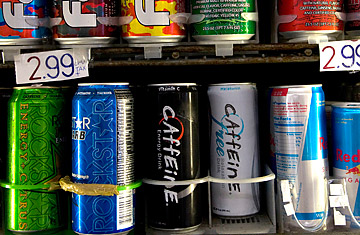
Energy drinks on sale in San Diego
(2 of 2)
Patterson suggests that coffee companies consider expanding into the energy-drink sector similar to the way Coca-Cola successfully moved into bottled water and noncarbonated drinks when competition began diluting sales of Coke. Industry experts speculate that coffee companies could turn the tide if they start launching aggressive marketing campaigns targeting younger people through social networks, coffee bars and high-profile ads that tout coffee's energy and mental-stimulation benefits.
Coffee is the alpha energy drink, and yet it's not being promoted that way, says John Glass, a managing director at Morgan Stanley. "Over the last five to 10 years, you've seen the explosion of Red Bull and other energy drinks because they've become so big and so aligned with action sports and stuff that's popular with the younger 20-something generation," says Yemma. "You don't see much marketing in the coffee sector."
Analysts say the coffee industry also needs to focus its marketing on specialty and gourmet coffees. "Starbucks paved the way" for this trend by introducing espresso-based drinks enriched and sweetened with cream, steamed milk, caramel syrup and other additives, says Mitchell Pinheiro, an analyst at Janney Montgomery Scott LLC. "They upscaled the coffee," says Harry Balzer, a senior executive at NDP Group, a market-research firm. Demand for common coffees is waning, says Pinheiro.
Coffee has to party more too. Irma Zandl, president of Zandl Group, a New York consumer-research group, notes that it was Red Bull's introduction into the bar scene, where people would order the drink with vodka, that first attracted consumers to it. (And exposed the company to criticism.) Likewise, "the best way to get them to consider buying a coffee machine and buying coffee is if they've had that experience in a fabulous coffee bar," she says. Zandl cites the Stumptown café in the Ace Hotel in New York City as an example.
Young people will dictate the coffee industry's long-term survival. "The baby boomers are getting older now," and the generation of 18-to-24-year-olds will likely be larger than the boomers as they grow up, says Glass. "Any long-term vision of any consumer business probably has to figure out how to appeal to that group." That could keep some coffee marketers awake at night, even if they're drinking decaf.
